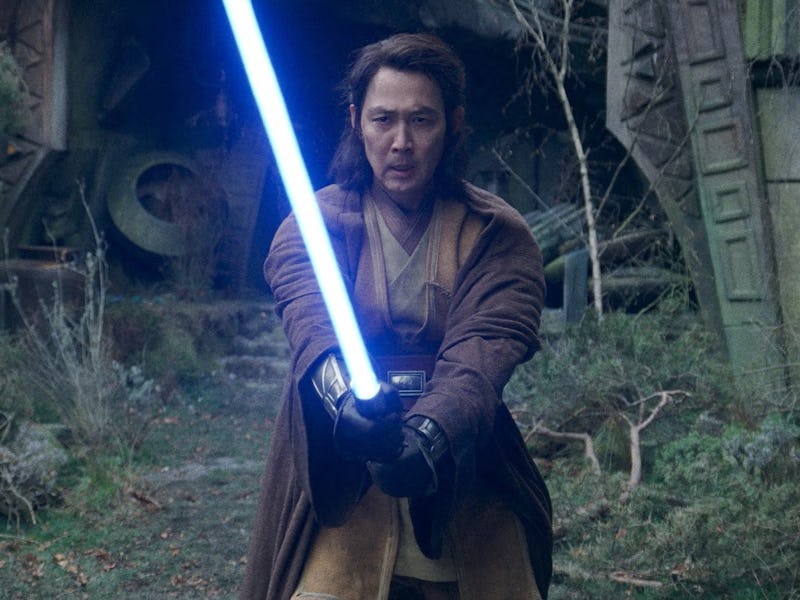Disney Needs to Learn a Painful Lesson from The Acolyte's Failure
Disney’s accountants live in a dream.

The Acolyte has been canceled after one season, which leaves all its major plot points in limbo. Osha and Mae will never resolve their differences, Qimir will never explain why the Sith are a necessary alternative to the Jedi, and Darth Plagueis will never emerge from his cave to get some desperately needed Vitamin D.
It’s difficult to talk about The Acolyte without acknowledging that it attracted repugnant vitriol from the subset of Star Wars fans most prone to laboriously breathing through their mouths, but the reality of its cancellation appears to be more anodyne, as Disney spent a purported $180 million on one of the least-viewed Star Wars series to date. That’s an eye-popping budget for a show that often looked cheap; while pre-release press bragged about “big and detailed” sets, on-screen it sometimes felt like the actors were doing Star Wars community theater.
But the bigger problem was that The Acolyte tried to do too much at once. It introduced the High Republic era to live-action, but never made the supposed height of the Jedi feel any different than the prequel movies set during their fall. It attempted to tell the tale of a mysterious Sith killer, but kept grinding to a halt with obfuscating flashbacks and tedious exposition. It tried to stand apart from the rest of Star Wars, but was stuck with an obligation to connect itself to the broader timeline. And, most disappointingly, it tried to set up a second season that will now never arrive, leaving Season 1 to end without any closure.
Star Wars’ best new villain in years will be lost before being properly developed.
The Acolyte had some sound ideas. Manny Jacinto’s snarky Sith, the first of his kind to have ambitions beyond running the galaxy while perpetually glowering, was an intriguing take on the desires of the Dark Side, and it’s a shame to lose him to the depths of Disney+. The fighting that broke out whenever the show paused its horrid dialogue was compelling, and any attempt to reexamine the Jedi after a half-century of portraying them as serene space wizards was welcome.
But The Acolyte used the budget of a blockbuster movie to tease lore reveals and future mysteries rather than tell a self-contained story, in the culmination of a misguided strategy for Star Wars television that’s produced a graveyard of mediocrities. Ahsoka, inscrutable and dull to anyone who hadn’t watched its animated source material, was also so focused on preparing for the future that it barely bothered to tell a story in the present. Kenobi had its moments, but was too mired in past glories. And if you can remember what The Book of Boba Fett was about beyond “Hey, remember Boba Fett? You like Boba Fett, right?” you either have an eidetic memory or you’re a liar.
At this point, it's reasonable to ask if Disney still has a plan for Star Wars TV. As noted by Forbes, there’s not much in the works. Andor will end after its second season, and Skeleton Crew is a limited series. Ahsoka is getting a second season, and more Mandalorian adventures might be coming, but that’s about it. If the studio does recommit to the medium, it clearly needs to change its approach.
Did The Acolyte really need to introduce a character best known from a meme?
Disney could use The Acolyte’s failure as a cowardly excuse to withdraw from diverse casting, but the real lesson here is that you shouldn’t budget enough money to buy a couple F-35s on a TV show that swears it will kick into gear by Season 2. The days of series getting a year or two to find their feet are long gone, and it’s bizarre that The Acolyte’s mandate was apparently “We need to tease the introduction of a character best known from a prequel meme” and not “We need to tell a satisfying story.”
The best Star Wars show, Andor, is studiously disinterested in connecting itself to the rest of the franchise, despite technically being a prequel. So why, in a streaming landscape where any show that doesn’t immediately become a megahit is doomed, are shows like The Acolyte forced to compromise themselves by putting the franchise’s hypothetical future needs before the present? It’s a consistently losing strategy, but it’s apparently the only one Disney can think of.
In some ways, The Acolyte feels comparable to the intriguing but clunky True Detective: Night Country, which was envisioned as an original story before being saddled with tedious lore obligations and left to fend for itself against self-professed horror fans who couldn’t even handle the apparent terror of seeing a woman on their televisions. Both had fun ideas, even if both failed to execute them. But only one cost an obscene amount of money, necessitating runaway success to justify the expense. True Detective is happily chugging into Season 5; Star Wars is spinning its wheels. At this point, it should be obvious why.